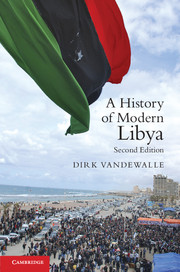Book contents
- Frontmatter
- Contents
- Illustrations
- Maps
- Preface to the Second Edition
- Preface to the First Edition
- Chronology, 1900–2011
- Acronyms
- Introduction: Libya, the enigmatic oil state
- Chapter 1 “A tract which is wholly sand …” Herodotus
- Chapter 2 Italy’s Fourth Shore and decolonization, 1911–1950
- Chapter 3 The Sanusi Monarchy as Accidental State, 1951–1969
- Chapter 4 A Libyan sandstorm: from monarchy to republic, 1969–1973
- Chapter 5 The Green Book’s stateless society, 1973–1986
- Chapter 6 The limits of the revolution, 1986–2000
- Chapter 7 Reconciliation, civil war, and fin de régime, 2003–2011
- Epilogue Whither Libya?
- Notes
- Bibliography
- Index
Chapter 6 - The limits of the revolution, 1986–2000
Published online by Cambridge University Press: 05 June 2012
- Frontmatter
- Contents
- Illustrations
- Maps
- Preface to the Second Edition
- Preface to the First Edition
- Chronology, 1900–2011
- Acronyms
- Introduction: Libya, the enigmatic oil state
- Chapter 1 “A tract which is wholly sand …” Herodotus
- Chapter 2 Italy’s Fourth Shore and decolonization, 1911–1950
- Chapter 3 The Sanusi Monarchy as Accidental State, 1951–1969
- Chapter 4 A Libyan sandstorm: from monarchy to republic, 1969–1973
- Chapter 5 The Green Book’s stateless society, 1973–1986
- Chapter 6 The limits of the revolution, 1986–2000
- Chapter 7 Reconciliation, civil war, and fin de régime, 2003–2011
- Epilogue Whither Libya?
- Notes
- Bibliography
- Index
Summary
In the wake of the US bombing of Tripoli and Benghazi in April 1986, the Libyan regime faced a number of internal and international challenges that gradually reduced Qadhafi’s ability to pursue his activist policies abroad and at home. They limited his ability to use continuous waves of political mobilization within Libya, and, by the end of the century, brought a halt to the waves of unpredictable political and economic directives at home. His revolutionary harangues throughout the period continued unabated – at a pitch temporarily heightened by the US military operation that killed Hanna al-Qadhafi, one of his adopted children – but there was an increasingly desperate tone and hackneyed quality to his rhetoric. Caged in by a combination of economic sanctions and diplomatic isolation, the Libyan regime responded with one of the few tools still at its disposal: a deepening involvement with international terrorism that would reach its most notorious climax in 1988 and 1989. But these, in more ways than one, were measures of last resort.
The international sanctions in 1992, and particularly the Arab countries’ initially neutral response to them, also prompted an important realignment of the county’s foreign relations. After years of pursuing unity schemes with various Arab regimes, Qadhafi announced that he could no longer tolerate their leaders’ lackluster responses to the Arab–Israeli conflict, or their passivity and their acquiescence in a political status quo throughout the region dominated by the US presence and its policies. As a result, the Libyan leader deepened his involvement with sub-Saharan Africa which he viewed as an area for projecting Libya’s power, and for implementing new regional, economic, and political unity projects (see Chapter 7).
- Type
- Chapter
- Information
- A History of Modern Libya , pp. 137 - 172Publisher: Cambridge University PressPrint publication year: 2012



